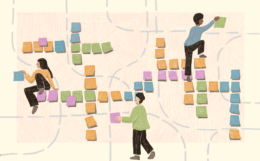
Get the Most Out of the New Work Methodology
The digital age and upcoming massive shifts in the working culture seem to be on everyone’s lips. There is no doubt that we live in interesting times, having a chance to witness what is probably one of the biggest transformations since the industrial revolution – so should we be concerned by the increasing role of automation, digitization, and artificial intelligence?
Many are wondering how they will adapt, survive and thrive in this fast-paced digital era. How do you ensure you’re prepared for and benefit from the inevitable organizational culture changes in the upcoming years?
Many modern workplace theories seem to hold the key to these questions and one of them is the “New Work” methodology.
Lifelong culture of learning
One of the biggest challenges for companies and employees is the constant change of duties and desirable skills. Shifting the mindset of processes and approaches is the first step towards becoming a company of the future.
Vast transformations in global labor markets require flexibility and agility – both from leaders and employees. The level of impact artificial intelligence already has on our work and our lives is huge, but for those that have the right skills and background, AI isn’t a threat.
Many companies, such as Finiata, support cross-functional work and offer in-house training (recruitment, leadership, inclusivity, and other knowledge that team members want to share in an open format).
At Finiata, each team member can attend a 1 day, per quarter, external knowledge session (eg. conferences, masterclasses, seminars) as paid leave. Moreover, Finiata offers Skillshare Licences which is a platform for personal and professional development.
Also, Finiata buys books requested by employees and makes them accessible for everyone to borrow, creating an open library for all team members.
Foreign language courses are also a fantastic way of broadening employees’ skill sets, particularly in international companies empowering diversity. Lifelong learning is becoming the new normal.
Efficient teamwork in New Work methodology
The role of cross-functional and efficient teams is priceless. Employees need to be a part of a community. Integrating social events may help, but the strongest bonds are built with those having a similar (or the same) sense of purpose.
We know that the best way of joining forces across whole teams is to set common goals and track the processes and outcomes. But what is the most efficient way to execute it? Finiata uses the OKR framework to help them align and track company-wide goals that require teamwork:
“The implementation of OKRs increases the effectiveness of your strategy performance…, OKRs have to be available to all employees in a company. The impact one can have, and knowing that they are contributing to something meaningful as a team, promotes ownership of work and collaboration.”
Luis Moreira-Matias (Ph.D.), Head of Data Science at Finiata
Yet the achievement of the goals wouldn’t be possible without effective communication. It helps to knowledge-share and in turn, be aware of any emerging problems. There are many digital tools that let you connect with the employees, for Finiata it’s Slack and its team channels.
Continuous performance feedback
“New Work” means a new approach to communication. Finiata believes in a continuous feedback culture and therefore has implemented a feedback-oriented performance program that is supported by a very sophisticated engagement and performance tool.
The most important pillars of the program are:
- Continuous feedback (on peer-to-peer and employee-to-manager level),
- Half-yearly review meetings,
- Development dialogue,
- Shout-outs during Finiata’s all-hands meetings.
All these practices offer space for discussion and give employees a sense of being active participants in the improvements and productivity of the workplace.

Flexibility for improved work-life balance
Offering flexible hours and the freedom to work remotely allows leaders to take advantage of their team’s most productive hours, while employees can adapt their work schedules into their lives more smoothly.
Finiata has very clearly communicated and documented remote work policies and offers flexibility during core working hours. This way the company makes sure that there is time for collaboration but also allows flexibility for each team member.
Moreover, Finiata was allowing remote work prior to the recent pandemic and adapted to the climate by broadening the offer for all employees, every day. They also provide the opportunity to work in their office space since some team members prefer to work from there.
Flat hierarchy promotes autonomy and ownership
One of the main elements of the “New Work” methodology is a flat hierarchy. This means keeping all employees on equal terms, getting input from all levels of the business, and providing real transparency.
At Finiata they believe in ownership and autonomy, which is why they work within a flat hierarchical model. The company also focuses on collaborative and cross-functional teamwork.
In dynamic business environments, organizations need to be able to adapt to changes or changing requirements quickly. This is why Finiata is constantly iterating its processes and is currently on its way from a flat, but traditional hierarchy, towards a more progressive and flexible organizational structure.
Reinventing recruitment and reducing attrition
If you want to implement all the core values of the “New Work” methodology, you must prioritize a human-centered approach. This means not only offering employees opportunities for development, building a community, and offering flexibility but also empowering and engaging them.
51% of employees want to stay at jobs with flexible working hours and remote options and there are 65% better retention rates in the engaged workplaces. If you build a strong, compelling workplace, talent will come and stay. But how do you inspire engagement?
Finiata plans to align its HR Programs with agile methodologies to accommodate the needs of cross-functional teamwork. It has a strong focus on its team members’ mental and physical health – offering an urban sports card, as well as training for remote workers (eyes, muscles, mediation).
Together, with a group of team ambassadors, Finiata has created an individual appreciation catalog that can be used at a manager’s discretion. The group has compiled “surprises, gifts, and actions” to support managers in keeping their teams motivated. Did you know that employees with lower engagement are four times more likely to leave their jobs than those who are highly engaged?
Well, now you know.
Humans and machines are joining forces
Unquestionably, the change of mindset is the first step towards the workplace of the future. “New Work” has already proved that human-machine collaboration is not only possible but also necessary to meet all the forthcoming challenges of digital transformation. AI, digitization, and automation of employee’s tasks will be used to augment human actions rather than to replace them.
The role of leaders is to guide these changes in the companies by redefining workflow, workforces, and workplaces. It involves harnessing new, emerging technologies, and processes, and making use of them in everyday life. It’s all about being prepared for what’s next.


